LandPKS supports ranchers, rangeland managers, and other land managers with open-source tools that allow them to easily access knowledge and information and to collect, share, and interpret their own soil, vegetation cover, and management data. This webinar series targets rangeland managers and others who are interested in learning how to use LandPKS and in exploring the app’s new Habitat and Soil Health modules in a rangeland management context. Each of these three, 45-minute webinars will focus on a different aspect of using LandPKS on rangelands: identifying land potential, monitoring vegetation, understanding habitat, and monitoring soil health.
This series was produced in collaboration with our partners at The Nature Conservancy in Colorado. An NRCS Conservation Innovation Grant supported this work.
Part 1: Learning about your Land and its Potential with LandPKS
Time stamps: Live demo at 15:31, Q&A at 28:52
Part 2: Monitoring Vegetation and Understanding Habitat with LandPKS
Time stamps: Adaptive rangeland management intro at 5:46, live demo at 18:30, Q&A at 38:50
Part 3: Monitoring Soil Health with LandPKS
Time stamps: Soil health intro at 4:30, live demo at 10:50, Q&A at 28:56
Further Resources
Intro to the LandPKS Habitat Module & Habitat Factsheets
Intro to the LandPKS SoilHealth module (new videos coming soon)
This article is part three in a series that tells the story of how Eco-Cycle and LandPKS came to collaborate. It also tells a bigger story: one about synergies between organic waste management and soil health. If you haven’t yet, read part 1 and part 2 first.
Since leaving organic farming and joining the Boulder non-profit Eco-Cycle in 2011, educating people about the connection between soil health and climate change has become Dan Matsch’s mission. Inspired by the Marin Carbon Project, one of the first documented instances of carbon farming, Dan became fascinated by the carbon sequestration that takes place when compost is applied to soil. Since then, he has been working on various projects at Eco-Cycle to promote soil health.
“What’s happened is this,” Dan explains: “we’ve interrupted the circular economy that nature had already established: the cycle of returning nutrients to the soil, which restores the nutrient density for the foods we eat. That is one reason why a carrot today is not as nutritious as a carrot that was grown in the past. We need to recreate this circular economy.” In addition, compost-amended soils are less susceptible to erosion, so instead of farming causing topsoil loss, it actually builds topsoil. “Building soil can help address 3 of our biggest problems: climate change, topsoil loss, and soil nutrient loss,” says Dan.
Though the benefits of adopting practices that foster healthy soil (also called “building soil”) may seem to clearly outweigh the costs, as a former farmer, Dan understands the challenges involved in large-scale changes in the agricultural sector. He explains, “Farmers have to be risk averse. We have to be conservative, because the margins are so thin. You don’t just buy a piece of equipment, or say you’re totally going to change your practices, unless it’s part of your larger plan.” There has to be even more of an incentive for farmers to do this, Dan argues. So, instead of directly trying to get farmers and ranchers to change their practices, Dan seeks to create demand for good soil health outside of the agricultural sector.
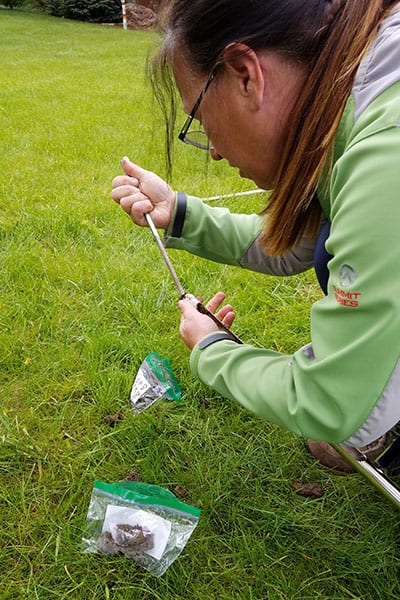
An Eco-Cycle carbon farmer collecting soil samples
“We felt like Eco-Cycle had a role to play in creating this demand by educating people,” he explains. In the spring of 2019, Eco-Cycle began its Community Carbon Farming Campaign to involve people in Boulder as citizen scientists to learn about sequestering carbon. Through this project, which is part educational message, part science experiment, Eco-Cycle hopes to create a sense of understanding of the value of building soil among consumers and people who work outside of the agricultural sector.
After the first year of the project, the Eco-Cycle carbon farming team realized that they required more knowledge about the soils they were testing. In 2020, Eco-Cycle partnered with LandPKS to collect soil data for the carbon-farming program. LandPKS trained participants to determine soil texture, for example, by conducting the “ribbon test.” Because knowing the texture of the soil on your land is so important for grasping the potential of that land, Eco-Cycle wanted to provide an easy and accurate way for participants to understand why their soil was responding to the experimental treatments like they were. For example, Dan explains, “if you have a sandy soil, your land doesn’t have as much potential as if you had a loamy soil. Or if your A horizon is clay and your B horizon is sand and it has a bunch of aggregate in it, you’re going to be struggling to hold onto water and nutrients.”
The additional data and understanding provided by LandPKS proved to be valuable to the program’s participants. Reflecting on her past year as a volunteer carbon farmer, Kristi Meyer said, “the value of soils is huge and people don’t realize it. It was all brand new to me. I thought it was fascinating to determine soil types. We’ve definitely enjoyed getting dirty and talking to our neighbors about the process.” Another participant, Kim Orr, said that, using LandPKS for the past year, “it became clear to me why it’s important to know what your soil is made out of. If you know that, you know what you can plant, how to amend your soil, and how much water it needs. That’s fascinating and useful to me as a gardener.”
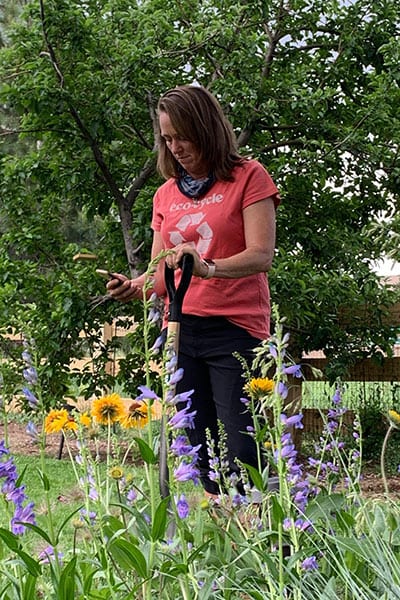
Kim Orr, an observational carbon farmer with Eco-Cycle, collecting data in the field
In terms of creating demand for producers who build soil, the program seems to be working. What if there were a Soil Builder certification, similar USDA Organic certification, on food packaging, I asked Kristi and Kim? Both said they would seek it out in the grocery store. “I would buy it, I would look for it, I would tell all of my friends and family about it. I feel like I would have been interested in soil health before, but now I know why and how important it is,” Kristi said.
The partnership between Eco-Cycle and LandPKS will continue into the program’s third and final year. In summary, Dan says, “LandPKS is in this suite of tools that I think is going to be super useful for making this connection between building soil and addressing these three global challenges. We’re all on the ride together. So what I’ve learned is that there’s a lot we have left to learn, but we’re on a hopeful track.”
Learn more about being an observation carbon farmer and sign up here.
Note: LandPKS has recently launched a new version of the app with an expanded SoilHealth module, based on the revised NRCS soil health in-field assessment protocol. Keep an eye on this blog for further updates, training videos, and insights about soil health, and be sure to download the latest version of the LandPKS app onto your device.
Part two in a series of blog posts that tells the story of how Eco-Cycle and LandPKS came to collaborate. It also tells a bigger story: one about synergies between organic waste management and soil health. If you haven’t yet, read part 1 first.
After over a decade of managing Gem o’ the Field, an organic farm just north of Boulder, Colorado, Dan Matsch found himself at a crossroads. He had just turned forty. Though Gem o’ the Field did brisk business at the Boulder County Farmers Market and was making a modest profit, Dan still didn’t have the funds to hire the full-time management staff he desperately needed. So, in 2001, Dan planted his final season of crops. That same year, he joined Eco-Cycle, where he already served on the volunteer board of directors, as an employee.
When Dan joined Eco-Cycle, the company was focused on one big question: how to build zero-waste communities. They steered their attention specifically towards organic waste. Comprising about 30% of the total waste stream, organic waste includes food scraps and garden trimmings, and, if uncontaminated by other waste such as plastic, is entirely compostable. The directors of Eco-Cycle wanted to look into the possibilities of composting on local organic farms. It was a research project, and they asked Dan to take it over.
After over a decade of working as an organic farmer and building his own compost, Dan seemed predestined for the job. However, he quickly unearthed an inconvenient fact: the State of Colorado does not allow for organic waste to be brought to farms for composting. The project was a dead end, its premise against state regulations. For a couple of years, Dan put composting on the back burner to work on another new Eco-Cycle initiative: the CHaRM.
Welcome to CHaRM
In the same year that Dan joined the staff, Eco-Cycle opened its Center for Hard to Recycle Materials, or CHaRM, and they asked Dan to manage it. The first facility of its kind in the United States, CHaRM began by recycling select electronics. Today, CHaRM recycles all types of electronics, as well as hard-to-recycle plastics, packing materials, appliances, mattresses, and more. Thinking back on the intensity of those first years at Eco-Cycle, Dan says, “the reality was, I hardly had any time to think about compost, because I was the only employee at CHaRM!”
Composting and recycling in Boulder, Colorado, in the early 2000s looked very different than it does today. The City of Boulder had no curbside program for organic waste collection, except for yard-waste, until 2006. In 2004, Eco-Cycle launched Colorado’s first commercial food waste collection program. Because of the special kind of truck required for residential hauling, Eco-Cycle stuck with the commercial side of things, picking up organic waste from restaurants and grocery stores and hauling the waste to A1 Organics in Golden, Colorado.
Also around this time, Dan and his colleague were shown a compost tea brewer at a trade show. They bought it on the spot, and Dan started brewing compost tea at CHaRM. “By then, a bunch of people were excited about recycling their organics, so we let people come to CHaRM with their kitchen scraps,” Dan explains. At CHaRM, this waste was vermicomposted to brew a “tea” of beneficial soil microbes and soil nutrients, which could then be poured into a watering can or an irrigation system and easily distributed across cropland. It wasn’t the massive on-farm composting program with curbside pickup that Dan had once dreamt of implementing, and didn’t have the benefit of adding organic matter to the soil, but it was a quick and easy way to start creating a compost product at CHaRM.
Back to the Farmers Market
If there was a single message that Eco-Cycle sought to convey in the early 2000s, it was that zero-waste and composting went hand-in-hand. In 2004, Eco-Cycle launched their first zero-waste event at Dan’s old stomping grounds, the Boulder County Farmers Market. It gave Dan a strange feeling to go back to the farmers market, which he had just left three years ago, to present them with the idea. However, his familiarity with the market was an advantage when it came to organizing the event. “I promised them we would take care of everything,” Dan recalls.
Zero-waste events were a brand-new concept, and Dan and Eco-Cycle needed to define the parameters. There would be no trash cans, only recycling and compost bins. Food vendors would be required to use compostable food packaging. A1 organics had agreed to receive the compost from these events. Sometimes, a few of Eco-Cycle’s dedicated volunteers would act as goalies for the bins, making sure that people put the right types of waste in each. However, Dan found that the most critical factor was signage design. It was crucial that the bins had clear, appealing signage so that people could comply with the disposal rules.
Dan and others Eco-Cycle thought that, as long as they were present at the farmers market, they might as well sell a product. As BCFM only allowed vendors to sell what they’d produced themselves, Eco-Cycle began selling their compost tea. But as a former BCFM vendor, Dan wanted to make sure that the product he was selling actually worked, so he began conducting compost tea trials at CHaRM and on his old farm.
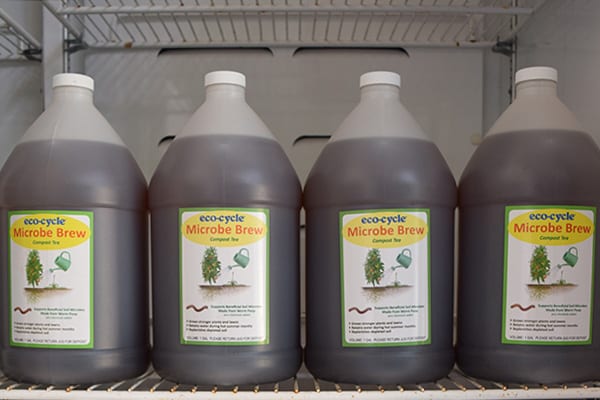
Bottles of Eco-Cycle’s microbe brew tea in the fridge
Dan’s experiments were not particularly scientific, but they did seem to indicate some benefits of applying compost tea. “For example, I had this big, empty greenhouse at the farm. Every year we would have an outbreak of grasshoppers inside the greenhouse. I planted some trays of basil in the greenhouse, half with and the other half without tea. But I had completely forgotten about the grasshopper outbreak! I showed up one day and immediately knew: oh no, the grasshoppers had hatched. The control basil was shotgun-riddled with holes. On the test side that had been treated with compost tea, there were only a couple of holes.” Dan’s interpretation was that the tea’s microbes seemed to build healthier soil, which grew healthier plants.
It became Dan’s passion to demonstrate to people that it’s possible to create high-value products like compost tea out of food waste.
A transformative moment for Dan was hearing John Wick of the Marin Carbon Project speak at a conference in 2012. Wick’s message of hope for climate change mitigation through what he called “carbon farming” gave Dan “a new sense of purpose. When I heard him make this connection between compost and climate change, bells went off.” From then on, educating people about the connection between soil health and climate change became Dan’s mission, and Eco-Cycle and CHaRM would provide him with the scaffolding for outreach and collaboration that would enable the next decade of his career.
This post is part one of a three-part series about the story of LandPKS’s partnership with Eco-Cycle. The series also tells a bigger story: one about synergies between organic waste management and soil health.
Like soil, life has layers. We go through phases and, more often than not, certain themes recur. Some collaborations only happen on the surface; others take root much deeper, connecting multiple layers of experience. This series of blog posts tell the story of how Eco-Cycle and LandPKS came to collaborate. It also tells a bigger story: one about synergies between organic farming, organic waste management and composting, and the health of soil. This first blog post tells the story of Dan Matsch, Manager at Eco-Cycle, and how he came to understand the fundamental connection between our two organizations.
“The farm was like Disneyland for me.”
Every summer when Dan Matsch was a little kid, his family would drive from Colorado to Iowa, where his uncles owned a farm. Dan loved it there: the animals, the tractors and equipment, and being outside. “The farm was like Disneyland for me,” he says. However, growing up just east of the Rocky Mountains near Denver, where summers are short and the climate is dry, farming didn’t have much appeal, and Dan wouldn’t be reintroduced to farming until he was in his twenties.
For college, Dan studied architecture at the University of Michigan, but his real education began after graduation. He stayed in Ann Arbor and rented a room in a house that was owned by one of the founders of Recycle Ann Arbor, a non-profit waste management agency. Through his housemate connections, Dan started working at Recycle Ann Arbor too, which began his career in the recycling business. Yet, an even more formative experience he had while living in that house was farming in the backyard.
“I was recycling for a job and gardening for fun.”
Reflecting on his first summer in that house, Dan says that the backyard “seemed completely wild to me. It was a jumble of trees and shrubs. I had no idea what was going on back there.” However, soon his housemates started bringing fresh fruit and vegetables in from the yard — “incredible stuff,” he remembers. “I can remember the first time my housemate came into the house and handed me a peach. I didn’t even know there was a peach tree out there. It tasted outrageous.”
In addition to the taste of the food, Dan loved the idea of providing for himself. There was an appeal to self-sufficiency, of growing something from start to finish. He sums up that period in his life this way: “I was recycling for a job and gardening for fun.”
A few years later, Dan enrolled in a program for agroecology at the University of California Santa Cruz. The program is built around a working farm, which the small cohort of under 30 students is responsible for keeping afloat. Looking back on the experience, Dan says, “It was fabulous. Immersive. You live there, you work there, you’re all in. I can’t imagine better preparation for farming on your own.”
Dan met his wife, Carol Conigliaro, in the program, and they planned to remain in California to farm after graduation. However, the plan changed when his sister married and Dan came back to Colorado for the wedding. His parents had purchased a new property in Boulder County. While visiting, he saw some organic farming going on in the neighborhood and thought to himself, “Good enough!” He told Carol that he thought it could work, and she was open to the idea. In 1989, they moved to Colorado to start a new farm on the family land.
Gem o’ the Field
“You couldn’t start more from scratch than we did, beginning with the soil, or lack thereof. It was very sandy and thin,” Dan says. Though he had ordered some lab tests of soil samples and talked to the neighbors about their land, it wasn’t adequate to really understand the variety of soil conditions on their farm, which they named Gem o’ the Field. Located on the Left Hand Creek floodplain, the land had been scoured by fast-moving water, which left rocks and rubble behind. As Dan dryly puts it, “it’s not exactly the Nile floodplain.”
In addition to the difficult soil, Dan recalls that there was no infrastructure to speak of: no irrigation system, no power, and no equipment. In spite of the significant challenges at the beginning, they made it work. With some help from his dad, Dan bought an old tractor. Dan learned how to weld, and they built a greenhouse for starting transplants.
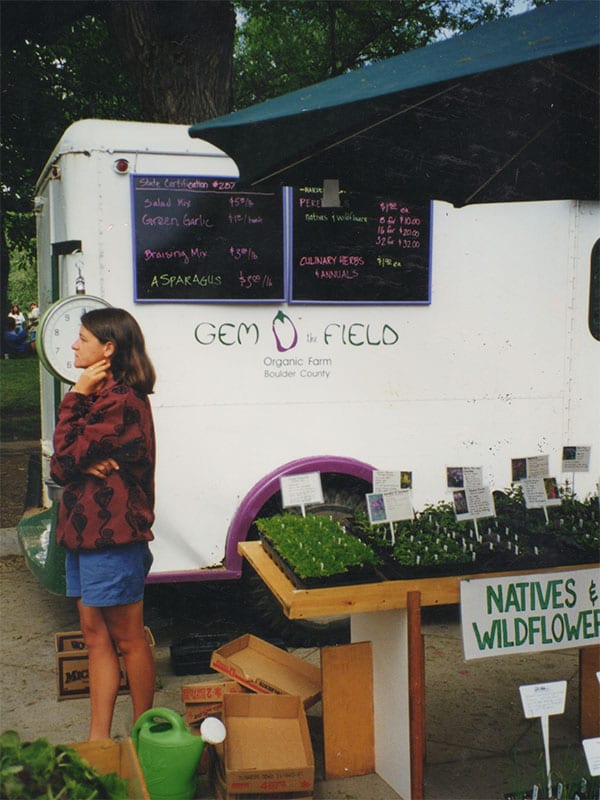
Carol Conigliaro at the Boulder County Farmers’ Market stand with the milk truck, circa early 1990’s. They sold native and wildflower starts in the spring for early income. © Dan Matsch
Because the farm was at the base of the foothills, Dan and Carol could grow cool-season crops through the summer. The Boulder County Farmers’ Market was a good way to ease into the market, and theirs became the go-to stand for mixed greens. They bought an old milk truck to keep their produce fresh at the market, which gave them an extra competitive edge. After a couple of years, the farm was working, and Dan and Carol were making a modest income.
When it came to planning, however, Dan and Carol had different aspirations. While Dan was focused on improving infrastructure and expanding the farm, Carol wanted to pursue other activities in the off-season. Eventually Carol went back to school and got a degree in Chinese medicine and Dan continued to run the farm without her. “But you know, it eventually caught up with me,” he says.
“I had employees, and this new burden of accounting and payroll. I wasn’t realistic about the time that took. I would do it in evenings and in my spare time, but it became all-consuming. For at least nine to ten months of the year, I was on seven days a week, slowly burning myself out. I loved it, but I had to face the fact that my body was kind of breaking down.”
The Flood
When Dan turned 40, he reevaluated. The farm was on marginal land and there was no clear possibility of expanding into better ground. He thought that, if he wanted to keep farming, he would have to start over somewhere else. “I didn’t feel like I was up for that,” he says. Dan stopped farming in 2001 and returned to his first line of work—the recycling business. He’s been working at Eco-Cycle ever since.
In 2013, a big flood swept across the Left Hand Creek floodplain. They had 18 inches of rain over the course of three days in September, usually one of the driest months. The flood washed away ten acres of topsoil. Dan says he will never forget walking through the property after the water subsided. He saw his soil profile for the first time in the eight-foot-deep arroyos: “The topsoil was sandy, but ok. Below it was two feet of rubble, then another six inches of topsoil, then another two feet of rubble, then another six inches of topsoil. That completely changed my perspective on the land, and I understood why I was having so much trouble.” Over three days, a flood revealed why ten years of farming had been so challenging.
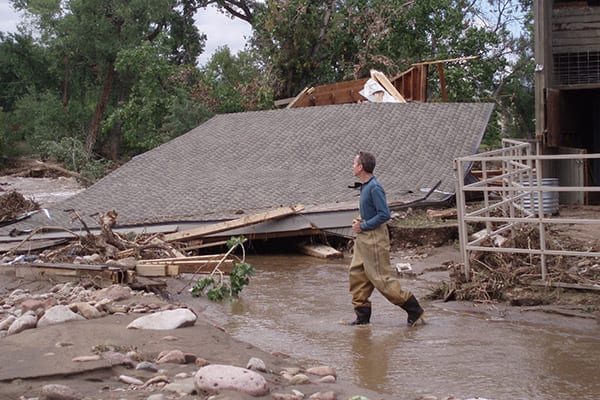
Dan surveying damaged barns from September 2013 flood, © Dan Matsch
“If I had had LandPKS at that time, I really doubt that I would have farmed there.”
LandPKS could have helped them in several ways, Dan explains. First of all, LandPKS could have helped them track management decisions and better understand what methods worked. Just trying to keep the soil moist required constant work, and Dan estimates that he spent a quarter of his time moving irrigation pipe. Though they paid a lot of attention to their soil, they didn’t have good tools for measuring it or for documenting their soil management decisions. Dan says that the LandPKS LandManagement module could have helped him keep better records and see some patterns that eluded him as a farmer.
The LandInfo module also could have been of use. “LandPKS offers immediate feedback, which would have been helpful to get a better sense of the whole property. The irony of it was, we were using the wrong part of our land,” Dan tells me. “Left Hand Creek bisected our property: the floodplain is on one side, and that’s where all of the development was. Across the creek, it’s a completely different ecosystem.”

Carol irrigating the “big” field, © Dan Matsch
There were a number of challenges associated with expanding across the creek, including the necessity of hiring more employees, and it took seven years before Dan was ready to do it. When he eventually did expand the farm to the other side of the property, he discovered the soil was a Valmont, much better soil for agriculture. “If we had had LandPKS, we would have learned exactly what that soil across the creek was from the start, and that could have completely changed what happened.”
For Dan, farming in Boulder County was bittersweet. “We had a good 13-year run. Our stuff was good. We poured our heart and soul into it and it showed. We had a really good reputation at the farmer’s market. I had a lot of pride in what we were able to accomplish under pretty tough conditions, but I wouldn’t do it again, and if I had had LandPKS at that time, I really doubt that I would have farmed there.”
Back to Recycling
Over the years, Dan and Carol learned a lot about soil. Since their sandy soil required a lot of added organic matter, Dan began making his own compost out of manure from a nearby goat dairy. Eco-Cycle, one of the oldest and largest non-profit recyclers in the United States, approached Dan when he stopped farming. They needed someone with composting expertise who could take on the challenges of organic waste management. The initial idea was to transport organic waste to local farms, where the composting would then happen on site. Did that work, I asked Dan? “No. But there are other possibilities, and I’ve spent the last 19 years trying to figure that out.”
